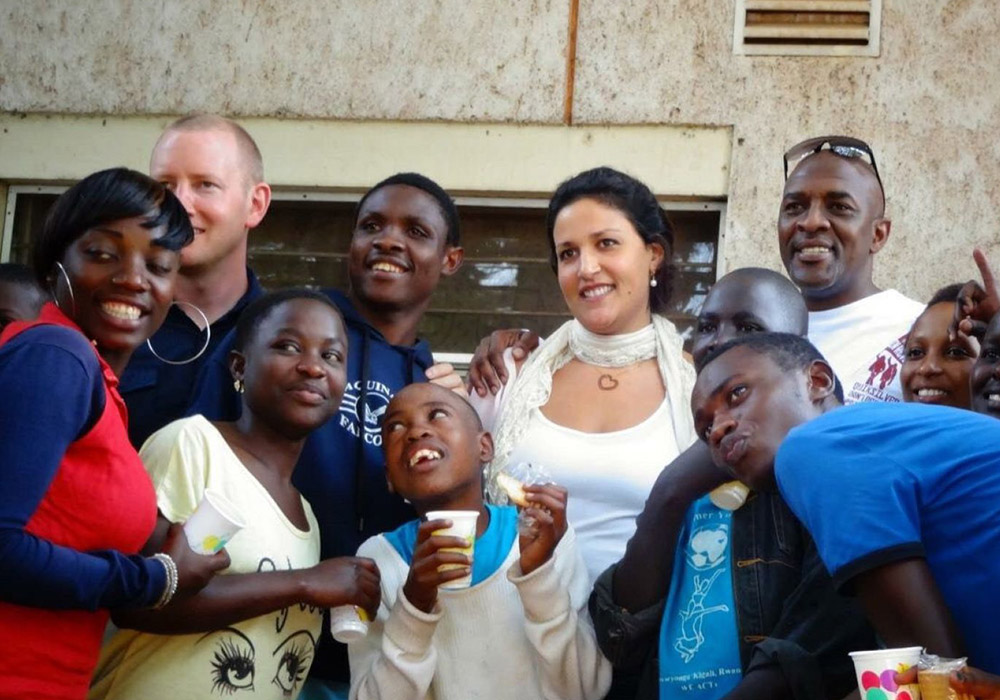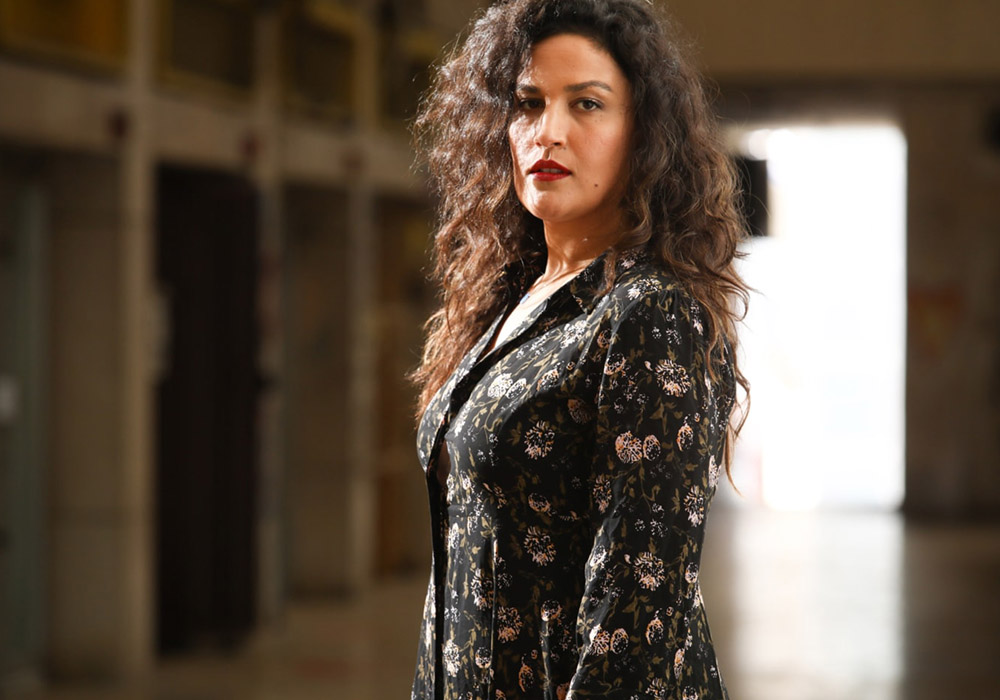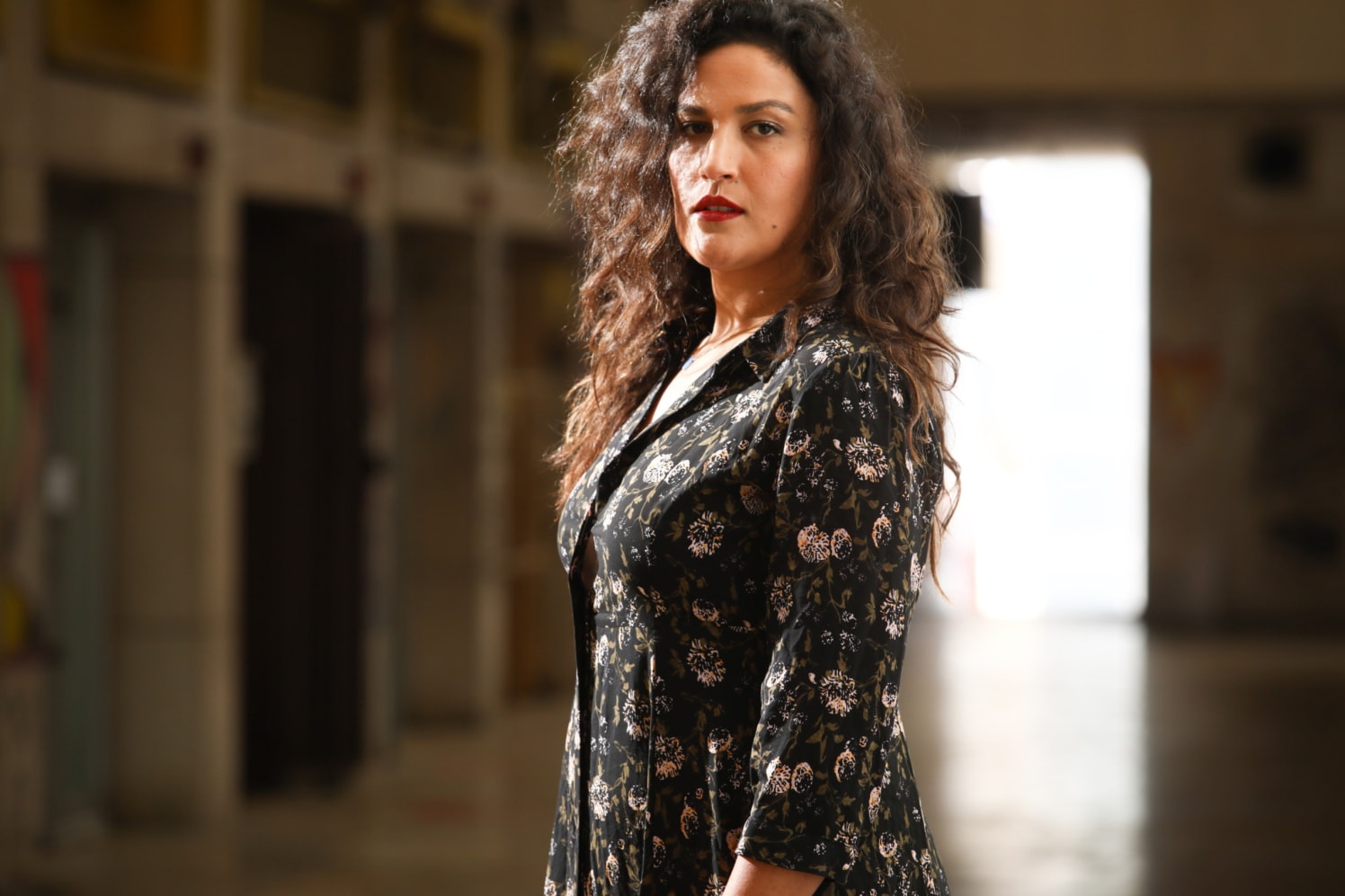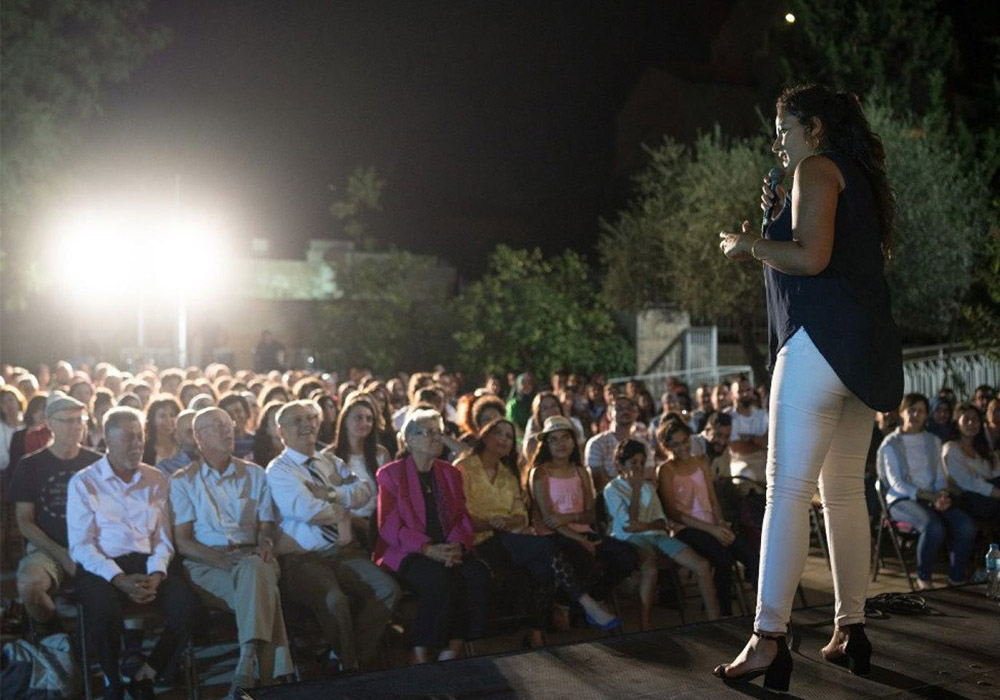This article was originally posted by Haartez.
Noam Shuster-Eliassi, a One Young World Ambassador from Israel, is a Peace builder, Comedian and Public speaker
Recently, comedian Noam Shuster-Eliassi gave one of her most fraught standup performances in East Jerusalem, before an entirely Palestinian audience. After the standup comedian who had invited her there, Amer Zahr, introduced her to the audience (“Today for the first time we have a Jewish sister with us”), the tension reached a peak, she says. “I go up, in front of an audience of 300 people, and in front there are two guys sitting with their arms crossed, looking at me angrily. I looked straight at them and said: ‘Don’t worry. I’ll be here for seven minutes, not 70 years.’ That broke the ice immediately. I left the stage in tears – I hadn’t expected such love.”
The topics dealt with in the 31-year-old Shuster-Eliassi’s act – which she has taken to a variety of venues, including not only East Jerusalem, but Berlin, Tel Aviv and Rwanda – include her childhood at Neve Shalom (in Arabic, Wahat al-Salam), the mixed Jewish-Arab community in the Jerusalem foothills, and what it’s like to be a tall (1.80 meters, or 5 feet 11 inches), dark-complexioned and curly-haired woman with a unisex name and a dominant presence, who has been told her whole life to avoid high heels but is, with or without, always the tallest woman in the room.
Her identity always confuses other people: After returning to Israel following studies in the United States, she sent her impressive résumé to an Israeli human rights organization – and it took no more than 10 minutes for the organization to get back to her. When she arrived for an interview, however, she was told she’d have to wait, as “There’s a guy before you named Noam Shuster.” It turns out that it’s not easy to go around “with the name of an Ashkenazi pilot in the body of an Amazon from Iran,” as she puts it.
After that interview, which was unsuccessful, she ran a peace-building organization, but this past year she took a sharp turn, and after years of political and quasi-diplomatic activity she loosened her tie, went on stage and opened her mouth. A month ago she was named “Best New Jewish Comedian of the Year” in a competition sponsored by London’s JW3 Jewish Community Center.
[[[ image 1-native]]]
She explains that after spending time working with people who had been children during the 1994 genocide in Rwanda and with Interpeace, which tries to bring together Arabs and Jews – “The pain in my throat released itself. Now I say whatever I want. I’ve moved from an attempt to influence through organizations and politics, to directly addressing the individual voice, in order to begin to build an alternative. I haven’t given up my desire to influence. Standup is a platform for making my voice heard, through stories. I don’t know if it’s having any influence, but at least during those seven minutes in front of a Palestinian audience, for example, we managed to create something different together. And this gives me another drop of hope.”
Undercover agent in the peace camp
“When we moved to Neve Shalom, my mother’s family didn’t fully understand the concept that we had moved with the purpose of living with Arabs. On our first Shabbat, my grandmother came to be with us. She came into the house slowly, carrying pots of food, and she said, ‘Shhhh, close the door. There are Arabs out there.’ I told her, ‘Grandma, don’t worry. They’re Ashkenazi Arabs. They won’t hurt you.”
Shuster-Eliassi is the daughter of an Iranian-born Jewish mother, and a father who was born in Jerusalem to Holocaust survivor parents from Romania. When she was 7, her parents decided to move to Neve Shalom. She learned Arabic very quickly and when then-First Lady Hillary Clinton and Sara Netanyahu visited the community during Benjamin Netanyahu’s first term as prime minister, in the 1990s, the premier’s wife said she was impressed by the fluent Hebrew spoken by the dark-skinned girl. She wasn’t the only one.
“Slowly it dawned on me that everyone was certain I was an Arab,” says Shuster-Eliassi. “There wasn’t any other Jewish girl there who looked like me. And with the Jews, I don’t feel like I entirely belong. I found myself in the middle. And I didn’t know how to give this a name.”
Even years later, the confusion in the environment persists. In 2016, at the annual rally to mark the anniversary of the assassination of Prime Minister Yitzhk Rabin, plainclothes police pounced on her and her boyfriend at the time – a Mizrahi Jew – because they thought they were Arabs who had come to carry out an attack. Instinctively she cried out in Hebrew and they stopped and disappeared.
People “always ask me two questions,” she says. “Am I an Arab, or am I an undercover agent. Why can’t I be a Jewish woman in the Middle East who speaks ‘non-security’ Arabic? I am an undercover agent in the peace camp. It’s impossible to reduce me to one single thing, and every element in my identity has something to say about this place.”
The main area in which the multiplicity of her identities makes things difficult for her, she says, is in finding a life partner. “That’s maybe the only place I’m insecure. Because who can take in and comprehend all this?”
In her act on stage, at any rate, this insecurity is not evident at all. There, she informs the audience: “I started doing standup because I don’t have sex.”
That might be an exaggeration. She reports that it’s now been two weeks since she last had sex, and, “I’m horny. When I make mujaddara” – a dish of lentils and rice or burghul – “the mujaddara spoon turns me on. And when I get turned on – wow, wow.”
She hasn’t got any other Noam
“After 2nd grade, I skipped right to 4th grade. My dad was so excited, he came to the principal and said, ‘I always knew my daughter was smart.’ And the principal replied: ‘It’s not that. She was just too tall for her grade.’”
Unlike many of us, Shuster-Eliassi doesn’t tend to connect only with people who resemble her. She has Jewish friends, Palestinian friends and friends from various other places and identities. She tells, for example, about a moving encounter with actress Golshifteh Farahani, who was expelled from Iran after appearing topless onscreen (and who participated in 2017 in a film by Israeli director Eran Riklis, “Shelter.”) In Paris, Farahani introduced her to a friend, an Iranian actress and singer who was forbidden to sing in her country.
“We have a common history, we are from the same place. In some other world, we might have met in Iran and traveled to Paris together,” Shuster-Eliassi fantasizes. “Maybe that’s the source of my great attraction to doing standup comedy abroad too. My experience isn’t reduced to here, and I don’t want to reduce it. On the contrary, I want to expand, to connect things, to understand them via other contexts.”
After doing national service in Israel (in place of the army), Shuster-Eliassi studied acting for a year at the New York Film Academy. She had a role in a short film by Talya Lavie, “The Substitute” (2006), before deciding to attend college on a scholarship at Brandeis University, outside Boston.
At Brandeis, she studied international relations, as well as theater. An internship with the women’s organization We Act is what brought her to Rwanda. We Act, she relates, was “the first organization that worked after the genocide with women who had been raped and were now HIV-positive.” It turns out that the rapists were getting medical care when they were tried in international courts but the women they had infected were left to their fate. Shuster-Eliassi says she “worked in clinics for women and youth and I helped set up recreational camps and programs, including music, art and theater workshops, which was a way of getting them to come in for medical treatment. I was just a tiny drop in the sea. The children and adolescents there did all the long-term work.”

After completing her studies at Brandeis, and before returning to Israel, Shuster-Eliassi went back to Rwanda another year. She says that while she was in school, “I simply was not able to deal with our conflict at home. I felt like I needed to go to some other place – to learn, to listen, to draw inspiration.
“When I first heard about [post-genocide] Rwanda,” she continues, “I didn’t really believe what I was reading. I didn’t buy it that they were living together, and that everyone was forgiving everyone else, the way the narrative being told to the world had it. I had to go there and see with my own eyes. And when I got there, I saw a far more complex situation.”
Nevertheless, Rwanda has become an example of possible coexistence in a place where it is least expected.
“One of the things I did was to attend one of the last ‘Gacaca’ sessions that dealt with the slaughter. It’s a traditional justice system that was used to settle communal disputes, and they used it after the genocide. I was at a session at which the defendant had murdered nine members of a family. He was brought in for a session in the presence of a sister who had survived. In her speech, she talked about how she would not forgive, would not forget and would not just carry on by herself.
'She said that if she could have, she would have taken revenge, but that quiet that was prevailing in the country at the moment and the horizon for her children were motivating her to concentrate on the next generation, to forget about the blood and the hate she carried with her. She spoke about her sacrifice, about how she was not teaching her children to hate, so that they would never experience the horror she had seen and survived. That moment touched me deeply – it’s not necessary to forgive, not necessary to live together in a euphoria of neighbourliness, but yes, it’s necessary to sacrifice, yes it’s necessary not to teach hatred, not to live only in the victimhood of the past. In the national ethos. Children deserve to live a life without war, revenge, hatred and blood.”
An ethos of victimhood and a life of war, revenge, hatred and blood is something we know well.

“Yes. When I arrived in Kigali, everyone rushed to take me to visit the museum that commemorates the victims of the genocide. On the one hand, it reminded me a lot of Yad Vashem. On the other hand, there was a whole room devoted to genocide in other places, other holocausts. There was a memorial corner dedicated to the Armenian holocaust, which we in Israel haven’t dealt with at all because of politics. It was eye-opening for young people there to be able to see that what happened to them in Rwanda was part of a mechanism, which also operated in other places, and they saw that it was permissible to connect their own suffering to other harsh pages in the history of mankind. Here, it isn’t like that. Our own Holocaust and suffering are framed in a separate pain that supposedly happened ‘only to us.’ I think that when we free ourselves from this we will be able to remember the Holocaust in a more honourable and non-manipulative way.”
‘You’re so beautiful! So fat!’
“My parents go to all kinds of lefty events. Now they’re taking a course about the Nakba. I called my mom one day, and she said, ‘Noam, I can’t talk right now. We’re on our way to the Nakba.’”
Five years after that formative experience in Rwanda, Shuster-Eliassi’s friends there saw online that she had turned to standup comedy. Thus she was invited to represent Israel last year at the Kigali International Comedy Festival. And as is usual with her, things got woven together: “A Jewish girl comes on stage, who looks to them like she’s half-Rwandan,” she smiles, and says that when she integrated words into her act in the Kinyarwanda language that she had picked up during her time there, the audience went wild. It turns out that there the word ‘bibi’ means something bad, rotten. “Onstage I told them that in Israel, ‘bibi’ is the same thing.”
In Kigali, she also received a unique compliment. “When I landed in Rwanda,” she says, “the first person who saw me asked me where I was from. I said: ‘Jerusalem,’ to which he responded, ‘You look to me like a cousin of Jesus. You are so beautiful! So fat!’” she laughs. “The ideal of beauty there is different. I walked around like Bar Refaeli. Here, there’s the worship of blondeness, slenderness, a small body. As for me, when I was 12, I could no longer find shoes in my size.”
‘There are people to talk to among the settlers’
“I’m a halfie – half-Ashkenazi, half-Mizrahi – with all the classic stereotypes. My dad has one sister, and my mom has eight! We call them the Muslim brotherhood.”
As noted, when she was in her early 20s, Shuster-Eliassi became a co-director of Interpeace, an organization founded by the United Nations that worked with “populations that were excluded or excluded themselves from the classic peace camp: ultra-Orthodox, rabbis, religious Zionists, Russian-speakers,” she says. And even settlers. The view she represents, which sees settlers as people you can talk with, is foreign to most of what is called the left in Israel. The settlers are indeed the ones who literally embody the occupation – and marking them as the ultimate “other” makes it possible for people on the left to live in communities within the Green Line that were built on the ruins of Arab villages, and to oppose the Palestinians’ right of return, even as they call themselves the “Zionist left,” to serve in the Israel Defense Forces and to deny insist on denying intra-Israeli injustices.
The work at Interpeace was a very significant process in Shuster-Eliassi’s life, she says. Among other things, the organization maintained a project with 40 ultra-Orthodox women who completed a master’s degree in conflict management. In this framework the women traveled to Belfast. After all, contributions to the resolution of the Catholic-Protestant conflict in Northern Ireland, which was as bloody as the Israeli-Palestinian conflict, were made by quite a number of activists from both sides there.
The heart of the matter, the right-wing power center, is not the ultra-Orthodox, she stresses, but rather the settlers. “We wanted to work with them, and the European Union was engaged in the matter,” she says. “There were three-year plans for work with leaders of religious Zionism. Each project was adapted to the group itself and no agenda was imposed from above. Because religious Zionism is so varied, with so many different voices, it was important that this variety of voices be present.”
Unsurprisingly, she does not wish to reveal the names of the people from religious Zionism who participated in the project. “It was all under the radar. The UN umbrella made it posssible for us to operate in total secrecy and gave us room to manuever. There were rabbis, community heads, journalists, mid-level leadership. It was a crazy roller coaster, which taught me that the truth really can’t be found in any one place.
“Above all I understood that these young people [settler youth] are the last Israelis who really have contact with Palestinians, and for better and for worse are aware of the difficult reality. I realized that the solution will come only from within, with extensive efforts inside religious Zionism. This is our time to aim for the sane voices, the non-messianic moderates – to take up the reins there, because the younger generation isn’t interested in violence and acts that are contrary to Judaism.
“People on the left manage to be forgiving toward the Palestinians – but they aren’t able to look at the difficult parts of our own people,” she says. “Our responsibility is to talk with our people. The Palestinians don’t want us to be nice and apologize. It’s exactly like what we say to men about not telling us how to conduct our struggle as women. The road to a solution goes through our dealing with the problems in our own midst.”
In the end, however, Shuster-Eliassi says all the work by Interpeace was for nought. “The UN got cold feet and shut down the project,” she says. “It was a particularly ringing slap in the face because we wanted to believe that there was an international organization that really wanted to have a genuine process with the relevant elements in Israeli society. Ultimately, though, politics got the upper hand. Apparently, it didn’t suit the UN to have work of this kind in the region attributed to them.”



